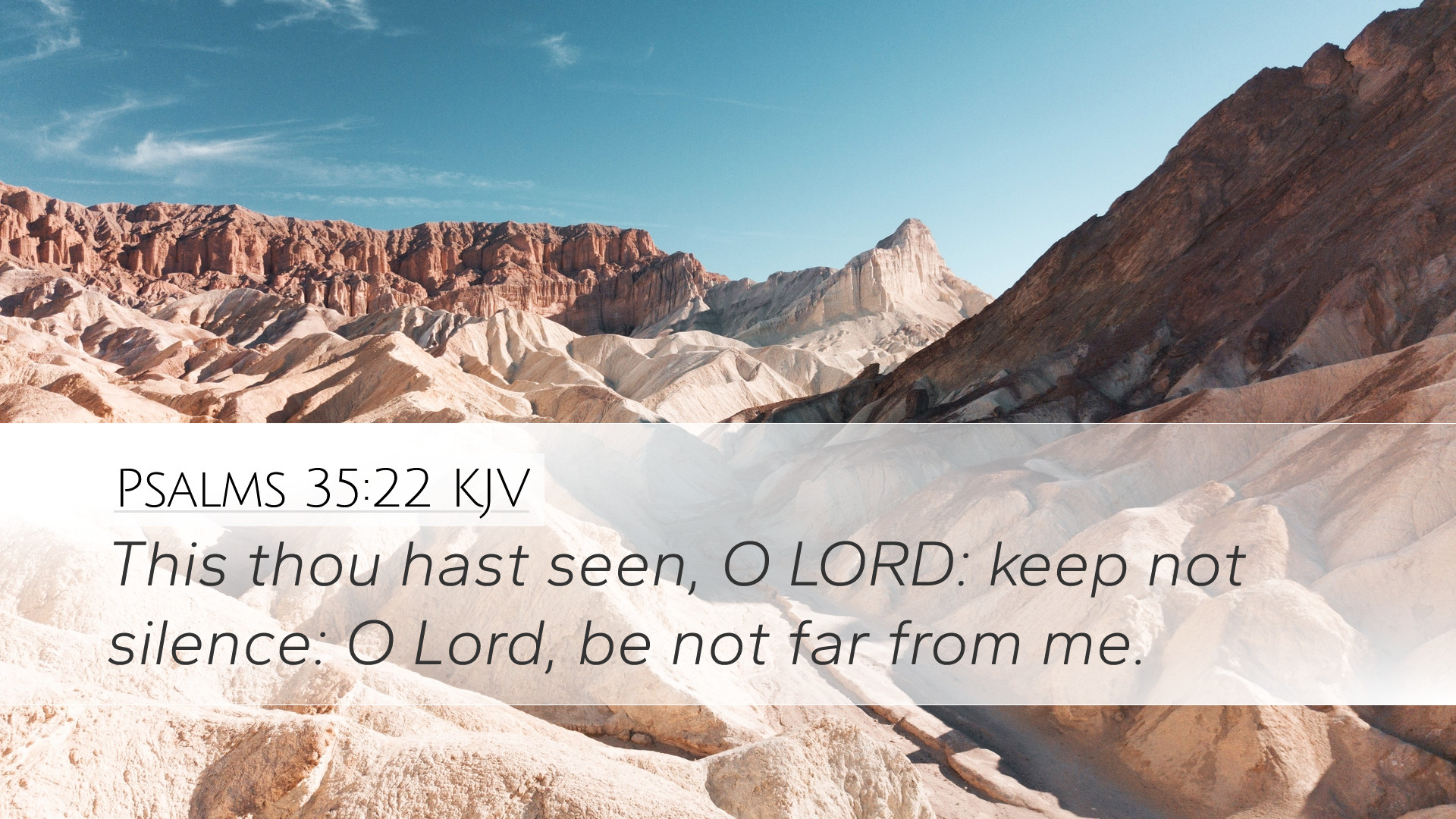Psalms 35:22 Commentary
Bible Verse: "This thou hast seen, O Lord: keep not silence: O Lord, be not far from me." (Psalms 35:22)
Introduction
Psalm 35 is a plea for deliverance, attributed to David, who finds himself in distress, surrounded by enemies. In verse 22, the psalmist cries out to God, highlighting the tension between divine silence and human desperation. Commentaries from Matthew Henry, Albert Barnes, and Adam Clarke provide profound insights into this verse, exploring themes of divine awareness, the urgency of prayer, and God's intervention in times of trouble.
Context of Psalms 35
The entire Psalm serves as an appeal for divine justice against false accusers and persecutors. David expresses his feelings of vulnerability and injustice, contrasting his innocence with the maliciousness of his enemies. This background informs verse 22, where the psalmist seeks confirmation of God’s attention to his plight.
Commentary Insights
-
Matthew Henry:
Henry emphasizes the assurance of God's oversight: "This thou hast seen, O Lord." He implies that God is neither indifferent nor unaware of human suffering. The psalmist’s appeal acknowledges God's omniscience, suggesting that God must intervene when the righteous are oppressed. Henry's commentary presents this verse as a reminder to believers of God's awareness of their struggles and His readiness to respond.
-
Albert Barnes:
Barnes provides a more analytical approach, indicating that the psalmist calls on God to "keep not silence." This reflects the urgency of David’s plea, indicative of a heart yearning for divine response. Barnes points out that the cry for God to "not be far from me" signifies a relationship where distance equals despair. He interprets this petition as an expression of the believer's deep need for God's presence in times of distress, thus fostering a sense of closeness with God amid adversity.
-
Adam Clarke:
Clarke focuses on the emotional weight of the verse. He interprets "keep not silence" as a cry for God to act, emphasizing the despair of feeling forsaken. Clarke notes that the phrase serves as both a plea and an affirmation of faith, suggesting that while David feels abandoned, he still trusts in God’s eventual intervention. This duality showcases the struggles many believers face in their faith journeys, where doubt and trust coexist.
Theological Significance
The theological implications of Psalms 35:22 extend beyond mere supplication. It raises essential questions about God's presence and the nature of prayer. The verse encapsulates the tension between divine sovereignty and human freedom. It also reflects a fundamental belief in God's active involvement in the affairs of humanity, which is a cornerstone of Judeo-Christian thought.
Furthermore, this verse contributes to understanding lament in the Psalms. It exemplifies how speaking honestly before God about one's emotions is both valid and necessary in maintaining a healthy relationship with the Divine. The structure of the plea indicates the importance of vocalizing distress: it is a necessary step towards receiving comfort and resolution.
Application for Pastors and Theologians
For pastors and theologians, Psalms 35:22 serves as a powerful reminder to encourage congregants facing hardship. The acknowledgment of God’s omniscience and the importance of bringing one’s worries before Him can foster a communal atmosphere of support and prayer. It invites a deeper exploration into the nature of God’s character, particularly His responsiveness to human lament.
In teaching contexts, this verse can inspire discussions around the nature of faith during trials. It affirms that seeking God's help is not a sign of weakness but an essential part of faith practice. Additionally, understanding this verse in relation to wider biblical themes of justice and divine assistance can enrich the congregational understanding of God’s role in human suffering.
Conclusion
Psalms 35:22 encapsulates a vital expression of faith amidst turmoil. Drawing insights from the commentaries of Henry, Barnes, and Clarke enriches our understanding of this poignant cry. It invites believers into a deeper relationship with God, assuring them that their struggles are seen and heard. The verse encourages a trust that, despite circumstances, God's faithfulness remains intact. Thus, as pastors, students, and theologians reflect on this scripture, it challenges them to embrace both their desperation and their hope in God's unwavering presence.


